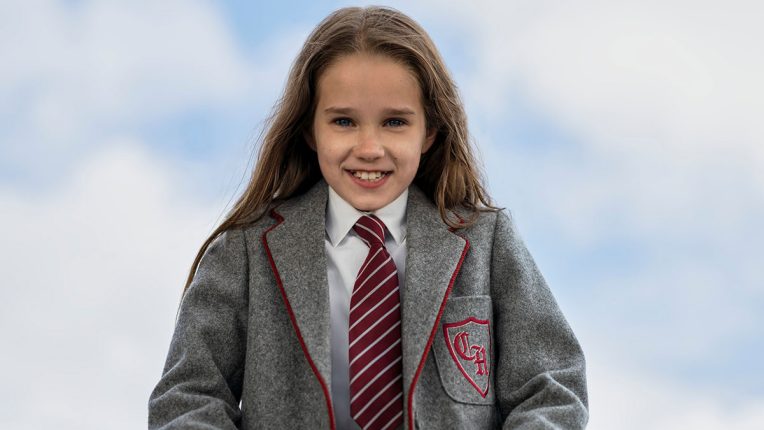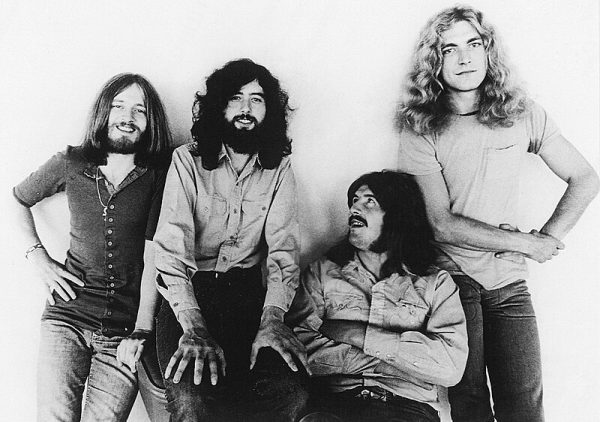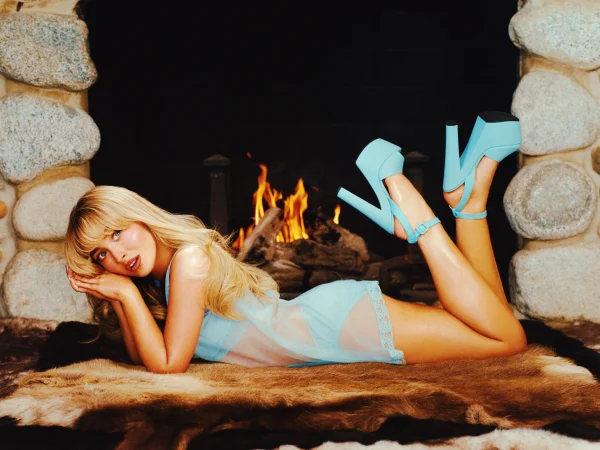Matilda: An Adaptation Done Right
Note: This article contains spoilers for Matilda and all of its adaptations, but I’ve tagged the spoilers when they appear in case you’d like to avoid them.
Ever since I first read the book, I’ve loved the story of Matilda.
Matilda, by Roald Dahl, tells the story of the titular character, an extraordinarily precocious little girl who loves reading, and how she fights back against abusive and powerful adults. She is able to have a great impact despite being small and seemingly powerless. To quote the song “Naughty” from the musical version, “Even if you’re little you can do a lot / you mustn’t let a little thing like little stop you.”
As a precocious little girl who loved reading myself, I saw myself in the character of Matilda. I wanted to be like her. I admired the way she stood up for what was right and was able to triumph, despite being surrounded by adults who held so much more power than her. (I had a perfectly lovely childhood and was surrounded by adults who supported me, nothing like the awful grown-ups in Matilda, but still I dreamed of being as powerful as her.)
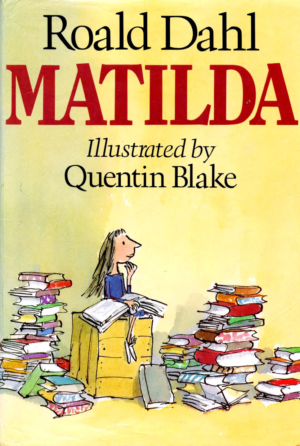
The original book by Roald Dahl, published in 1988, is really quite good. Roald Dahl was pretty awful as a human being (and by awful, I mean racist, misogynistic, and massively antisemitic), but as an author he was truly fantastic. He has a writing style that is very distinctive and kind of hard to describe. It’s humorous, evocative, creative, directed at children without being patronizing or overly simplistic.
It seems to me that children’s books are some of the hardest books to write, because you have such a small length in which to fit a story, you have to keep it appropriate for children while still interesting, you want to make sure that adults reading it aloud to kids aren’t bored either, generally you want to have a good moral in there, but not so obviously that a kid reading it will shake their head in disgust at the obviousness of the moral, and so on. Roald Dahl excels at all of these things.
As you can probably tell by now, I absolutely love the book Matilda. I’ve read it more times than I can count, and it only gets better the more I read it. It’s definitely a comfort read for me. And I’m not the only one; Matilda is wildly popular, and it also happens to lend itself particularly well to adaptations. It’s short, without excessive plot that needs to be cut to make it into a movie, and it is wonderfully compelling.
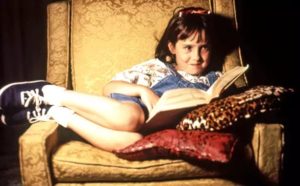
The first adaptation was the 1996 movie Matilda. It was directed by Danny DeVito and stars Mara Wilson as Matilda. I haven’t seen it since elementary school, but I remember enjoying it. I’m mostly mentioning it in this article for completion; really what I want to rave about is the musical and subsequent new movie.
The musical I’m referring to is, of course, the 2010 adaptation. It has music and lyrics by Tim Minchin and a book by Dennis Kelly. It premiered first at a local theater in England in 2010, then on the West End in 2011 and Broadway in 2013. Since then, it’s had various tours, and it’s also a very popular choice for schools. (I’m surprised Shorecrest hasn’t done it yet, actually.) It won a number of awards, including an Olivier Award for Best New Musical and a Tony Award for Best Book of a Musical.
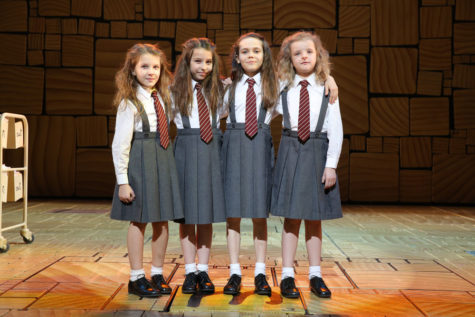
I saw a performance of Matilda the Musical at Village Theater several years ago, which I enjoyed, but I don’t remember all the details. The synopsis is on Wikipedia, though, and the Broadway recording of the soundtrack is available on Spotify or wherever you listen to music. (When I started writing this, the London recording was also available, but it was taken off Spotify sometime in the past few months. I’m not sure why. I liked the Broadway recording better, in any case.)
I’ve been listening to the soundtrack a lot lately, and it has quickly become one of my favorite musicals. Most of the songs are incredible, and even those that I originally thought were skippable have started to grow on me. My personal favorites are “Naughty,” “School Song,” “When I Grow Up,” and “Revolting Children.” They are energetic and emotionally powerful, with catchy lyrics and generally fantastic songwriting.
The musical is mostly true to the book, including details like Matilda mixing her mother’s platinum blonde hair dye with her dad’s oil of violet hair tonic (“Naughty”). It does do one weird thing that I have mixed feelings about:
View Spoiler
Throughout the musical, Matilda makes up a story about an acrobat and an escapologist who have a daughter, who ends up in the care of the acrobat’s sister, a world champion hammer thrower, who abuses the daughter. It turns out that this story is the true story of Miss Honey’s childhood.
This has always felt weird to me, and I don’t understand how it makes any sense in the world of the story. I’m hoping they don’t keep it in the movie adaptation. (Alas, they did keep it in the movie adaptation. It grew on me a bit in context, but I still think they could have cut it.)
Most recently, there was a movie adaptation of the musical, released in December 2022. I waited anxiously for this to come out, because, as mentioned, I’m a huge fan of the musical, and I was excited to see if the movie was a good adaptation of it. Success, it absolutely was!
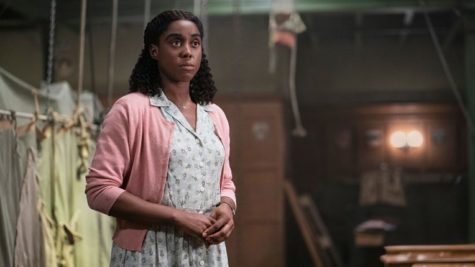
I wrote up some thoughts about the movie before it came out, because I was just that excited. Here they are, unedited:
There are a few parts of the trailer that made me a little concerned, especially the part where
View Spoiler
it appears that Matilda uses her mental powers/telekinesis to lift a whole mass of dark, scary chains to threaten the Trunchbull. What is this? What happened to the chalk??
I fear they may try to make things bigger and showier for the movie, compromising the message that you can accomplish great things through small actions, even if you’re small and don’t have a lot of power. However, I loved the snippets of song and dance in the trailer: it looks like they’re keeping the feeling of a musical with big group songs and choreography.
The thing that made me most excited for the movie was when they released the soundtrack version of “When I Grow Up,” one of the best songs in the show. The kids are fantastic in it, of course, but what really made me fall in love was when Lashana Lynch as Miss Honey came in. I’ve listened to a number of different recordings of this song, and Miss Honey’s verse has always felt the weakest to me, but Lynch completely changed how I see it. Her voice is gorgeous and has so much emotion and character in it, making her verse my favorite part of the song. I am SO EXCITED to see her embody Miss Honey. I’ve been listening to this version of the song on repeat since it came out.
The adaptation was directed by Matthew Warchus and stars Alisha Weir as Matilda, along with Lashana Lynch as Miss Honey (Matilda’s kind teacher) and Emma Thompson as the Trunchbull (the bulliest bully there ever existed and the headmistress of Matilda’s school). And it is really good! Every single actor is incredible, for one thing, and they perfectly embody the characters. In most book-to-screen adaptations, there’s at least one character whose adaptation bugs me, but all of these ones genuinely seem like they walked off the page. I could rave about every actor’s performance for pages if you let me, including the minor ones like Meesha Garbett as Hortensia. (Her dancing! Her expressions!)
(Okay, I’ll be honest, I could rave about every aspect of this movie for pages if you let me. I will try to restrain myself.)
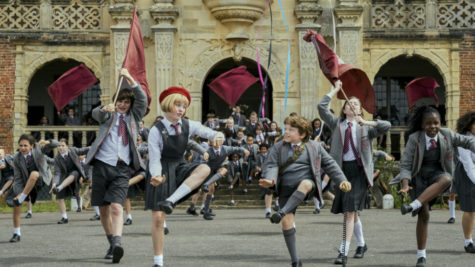
The movie leans into a showstopping musical vibe, and it does a great job. There are multiple big dance numbers, featuring literally hundreds of kids dancing and singing together. I loved the choreography and energy of these songs. It really made the movie feel like a stage musical brought onto a screen, but bigger and better, not limited by the size of a stage. It also made it feel more like a family movie, which was definitely their intent, but not in a bad way.
As far as I can tell, the movie was pretty accurate to the musical, but they did make a few changes. Most notably, they cut the songs “Loud” (which ties into a removed subplot about Matilda’s mother being a ballroom dancer), “Telly” (a fan favorite, but it was sung by Matilda’s father and brother, and her brother was cut), “Pathetic”, and “This Little Girl.” The movie version is fine without all of those songs; they were the least significant and least popular. However, I am a tiny bit sad that “Pathetic” and “This Little Girl” were cut, because they’re sung by Miss Honey, and I loved Lashana Lynch so much that I wanted to hear more of her singing. Miss Honey does still get the song “My House” and a few other solo verses, so it’s fine, really, but I wish I could hear more of her.
They also added a song, “Still Holding My Hand.” I found it kind of mediocre compared to the other songs in the movie, but I understand why it was added. They needed a song to accompany a nice happy montage at the end of the movie, which isn’t necessary in the stage musical, and it served perfectly adequately.
All of those changes were fine, and I don’t have a problem with them. What I do have a problem with is exactly what I feared from the trailer: they made Matilda too powerful, and they also made it seem like she was the only one who resisted the Trunchbull. In the book, there’s a whole scene about how other children fight back too:
“‘It’s like a war,’ Matilda said, overawed.
‘You’re darn right it’s like a war,’ Hortensia cried. ‘And the casualties are terrific. We are the crusaders, the gallant army fighting for our lives with hardly any weapons at all and the Trunchbull is the Prince of Darkness, the Foul Serpent, the Fiery Dragon with all the weapons at her command. It’s a tough life. We all try to support each other.’”
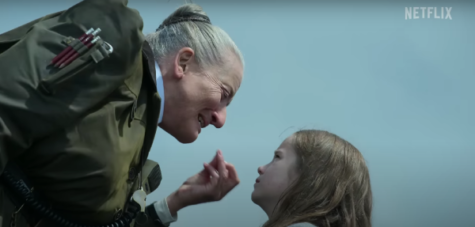
But in the movie, Matilda is so powerful that it seems like she’s the only one fighting this war. The narrative suggests that no one else was lifting a finger to resist the Trunchbull until Matilda showed up, and then nearly instantly… well, if you’ve seen any version of Matilda, you know what happened. And it implies that the only way anyone was able to finally take a stand was because it was Matilda and she’s special. She’s even more special and powerful in the movie than in the book, if that’s possible, and the Trunchbull is correspondingly more determined. It ends up turning into almost a duel between the two of them, complete with dramatic special effects that do not need to be there. I was rather annoyed by this change, because one of the things I loved most about the original book was that it was a really inspiring narrative about how even ordinary little kids can make a difference.
But you have to understand that the reason I’m complaining about this is because I’m so obsessed with the movie that I am overanalyzing it. It’s actually an incredible movie that I fell in love with immediately, even with its occasional flaws. If I had any free time and a shorter list of other shows I’ve been meaning to watch, I would rewatch it, probably more than once.
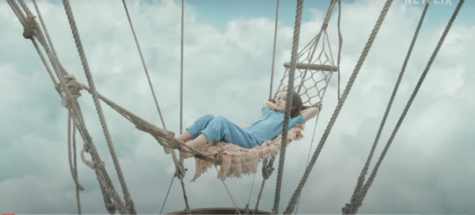
The whole thing just came together into such a powerfully emotional story that I’m struggling to put into words how much I loved it. For instance, take the song “Quiet.” In the videos I’ve seen of this song performed on stage, it mostly consists of Matilda standing in place and singing. This is fine, because it’s an inherently powerful song and the actress who plays Matilda is generally very good, but it’s somewhat boring to watch. In the movie, on the other hand, the camera movements, the setting, and the powerful acting by Alisha Weir combine to really get me inside her head. The same is true for the rest of the movie. (You can watch the movie version of “Quiet” here.)
If it isn’t clear yet, I would highly recommend Matilda. They did a wonderful job adapting the musical to the big screen, and it has quickly become my favorite adaptation. It’s a great family movie, but it’s also great even if you don’t have little siblings to watch with. If you like musicals with wonderful songs and dancing, loveable characters, and stories of love and kindness triumphing over injustice, I encourage you to check it out.
Roald Dahl’s Matilda the Musical is available to stream on Netflix.



